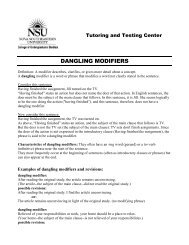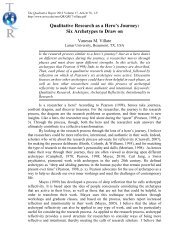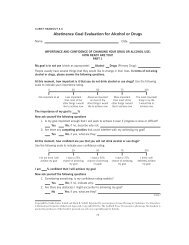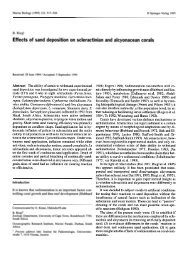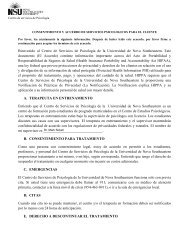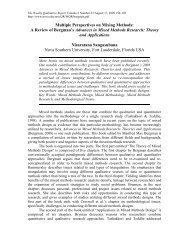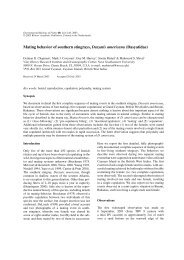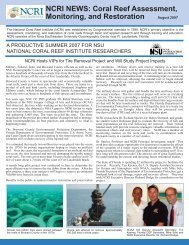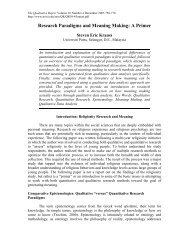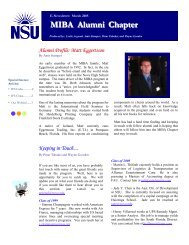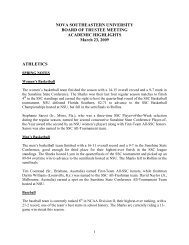Contextualizing Theories and Practices of Bricolage Research
Contextualizing Theories and Practices of Bricolage Research
Contextualizing Theories and Practices of Bricolage Research
You also want an ePaper? Increase the reach of your titles
YUMPU automatically turns print PDFs into web optimized ePapers that Google loves.
10 The Qualitative Report 2012<br />
or institutional contexts), beyond intervention methods, that affect academic<br />
performance.<br />
To engage in inquiry that avoids monologicism, Kincheloe adopts a critical<br />
constructivist position that all knowledge is crafted in a contextualized space. This means<br />
that, for him, knowledge is temporal <strong>and</strong> culturally situated (Kincheloe, 2005a). To<br />
respect this complexity, he suggests that bricoleurs adopt a process he calls symbiotic<br />
hermeneutics. This process is designed to help bricoleurs explore how contexts <strong>and</strong><br />
relationships constitute phenomena; it “dem<strong>and</strong>s that relationships at all levels be<br />
respected <strong>and</strong> engaged in . . . [ways] that produce justice <strong>and</strong> new levels <strong>of</strong><br />
underst<strong>and</strong>ing” (Kincheloe, 2004c, p. 69). This allows bricoleurs to examine phenomena<br />
not as detached things-in-themselves, but as connected things-in-the-world. For<br />
Kincheloe (2004b) symbiotic hermeneutics entails the development <strong>of</strong> a complex<br />
ontological <strong>and</strong> epistemological awareness <strong>of</strong> objects <strong>of</strong> inquiry. This means that<br />
bricoleurs seek out ways that phenomena are interconnected with other phenomena, <strong>and</strong><br />
socially constructed in a dialogue between culture, institutions, <strong>and</strong> historical contexts.<br />
Ontologically, bricoleurs examine how socio-historical dynamics influence <strong>and</strong><br />
shape an object <strong>of</strong> inquiry. For Kincheloe (2005b), an<br />
object <strong>of</strong> inquiry is ontologically complex in that it cannot be described as<br />
an encapsulated entity. In this more open view <strong>of</strong> the object <strong>of</strong> inquiry, it<br />
is always a part <strong>of</strong> many contexts <strong>and</strong> processes, it is culturally inscribed<br />
<strong>and</strong> historically situated. (p. 333)<br />
Epistemologically, bricoleurs explore how the foundations <strong>of</strong> knowledge <strong>of</strong> a given<br />
context surround an object <strong>of</strong> inquiry. For example, bricoleurs examine, through<br />
processes like Foucauldian genealogies, the histories <strong>of</strong> thought that shape a<br />
phenomenon. Or, as Kincheloe (2004a) puts it, “the complex view <strong>of</strong> the object <strong>of</strong><br />
inquiry accounts for the historical effort to interpret its meanings in the world <strong>and</strong> how<br />
such efforts continue to define its social, cultural, psychological, <strong>and</strong> educational effects”<br />
(p. 7). In this way, epistemological analysis helps bricoleurs underst<strong>and</strong> how dominant<br />
rationalities influence underst<strong>and</strong>ings <strong>of</strong> a phenomenon.<br />
Kincheloe explores symbiotic hermeneutics in his text The Sign <strong>of</strong> the Burger:<br />
McDonald’s <strong>and</strong> the Culture <strong>of</strong> Power (2002). Employing a multi-theoretical <strong>and</strong><br />
methodological framework, his bricolage analyzes the McDonald’s corporation’s<br />
“sociocultural, political, <strong>and</strong> economic power” (p. 9). Employing ontological <strong>and</strong><br />
epistemological analyses, Kincheloe shows how McDonald’s’ cultural, semiotic, <strong>and</strong><br />
pedagogical power is symptomatic <strong>of</strong> much broader ideological contexts that make up<br />
Western societies. His text “employs a mutually informative, synergistic bricolage <strong>of</strong><br />
research methods . . . [that includes] ethnography, content analysis, historiography,<br />
cultural studies analysis, rhetorical analysis, semiotics, <strong>and</strong> critical hermeneutics” (p. 11).<br />
Ontologically, he explores how free-market capitalist contexts, social histories, <strong>and</strong><br />
dominant neo-liberal discourses/ideologies contribute to the predominance <strong>of</strong> capitalist<br />
world views which maintain the corporation’s power. Epistemologically, he shows how<br />
dominant knowledges, ideologies <strong>and</strong> discourses facilitate the continuation <strong>of</strong><br />
corporation’s powerful place in the world. Further, he shows how McDonald’s has<br />
capitalized on these discourses in ways to increase their power. Convincingly, he



